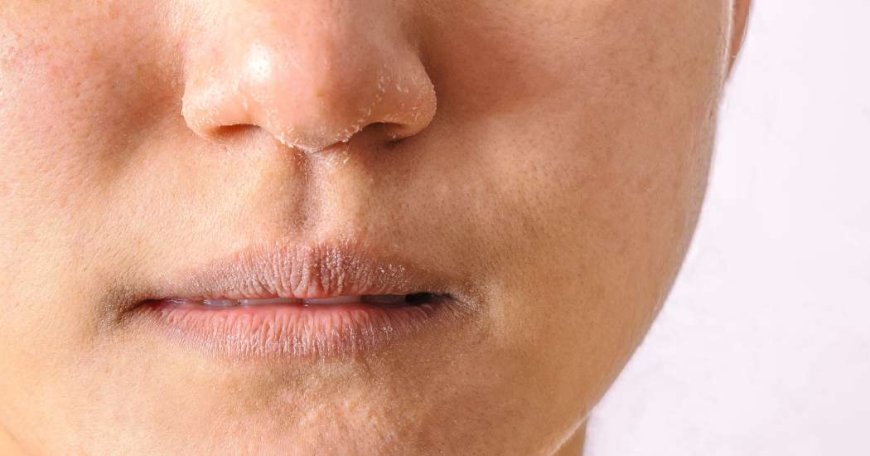Dry Skin vs. Dehydrated Skin: Key Differences & How to Fix Both
Is your skin dry or just dehydrated? Learn the key differences, signs, and best skincare tips for both conditions to achieve a healthy glow.

Introduction
Many people mistakenly use the terms dry skin and dehydrated skin interchangeably. While they might seem similar, they are entirely different skin concerns that require different treatments.
If you've been struggling with flaky, rough, or tight skin, understanding the difference between dryness and dehydration is the first step toward choosing the right skincare routine. In this article, we will break down:
✔️ The key differences between dry and dehydrated skin
✔️ Signs to look out for
✔️ Effective treatments and skincare routines
✔️ Expert-recommended products and lifestyle changes
Dry Skin vs. Dehydrated Skin: The Core Difference
The biggest difference between dry skin and dehydrated skin is what your skin is lacking:
- Dry Skin: A skin type that lacks oil (sebum). It is usually genetic and requires nourishing oils and rich moisturizers.
- Dehydrated Skin: A temporary skin condition caused by a lack of water in the skin. It can happen to anyone, even if they have oily or combination skin.
1. What is Dry Skin?
Dry skin is a skin type, meaning it is part of your genetic makeup. People with dry skin naturally produce less sebum (oil), which makes their skin feel rough, flaky, and tight.
Signs of Dry Skin:
✔️ Feels rough and flaky
✔️ Looks dull and lacks a glow
✔️ More prone to irritation and redness
✔️ May develop cracks or peeling
✔️ Often worsens in cold weather
What Causes Dry Skin?
- Genetics (some people naturally produce less oil)
- Harsh weather conditions (cold, dry air)
- Overwashing with strong cleansers
- Aging (as we age, oil production decreases)
- Certain skin conditions like eczema and psoriasis
➡️ Pro Tip: If your skin is dry, focus on using nourishing oils, rich moisturizers, and gentle cleansers to restore hydration.
2. What is Dehydrated Skin?
Dehydrated skin is a skin condition that occurs when your skin lacks water, not oil. This means even people with oily skin can have dehydrated skin.
Signs of Dehydrated Skin:
✔️ Feels tight but can still be oily
✔️ Fine lines become more visible
✔️ Looks dull and tired
✔️ Increased sensitivity and redness
✔️ Makeup settles into creases easily
What Causes Dehydrated Skin?
- Not drinking enough water
- Too much caffeine or alcohol, which dehydrates the skin
- Harsh skincare products, like exfoliants or drying toners
- Overexposure to sun and pollution
- Air conditioning and heating drying out the skin
➡️ Pro Tip: If your skin is dehydrated, focus on using hydrating serums, humectants like hyaluronic acid, and drinking plenty of water.
How to Treat Dry and Dehydrated Skin
Best Skincare Routine for Dry Skin
If you have dry skin, you need to restore oil levels and protect the skin barrier.
✔️ Cleanser: Use a gentle, hydrating cleanser (avoid foaming cleansers)
✔️ Toner: Skip harsh astringents—opt for hydrating toners with glycerin
✔️ Serum: Use hyaluronic acid to attract moisture
✔️ Moisturizer: Look for ceramides, shea butter, and squalane
✔️ Oils: Apply facial oils like argan or jojoba to lock in moisture
✔️ Sunscreen: Always protect your skin with SPF 30 or higher
➡️ Recommended Products: CeraVe Moisturizing Cream, The Ordinary Hyaluronic Acid
Best Skincare Routine for Dehydrated Skin
If your skin is dehydrated, the goal is to replenish water levels and prevent moisture loss.
✔️ Cleanser: Use a hydrating gel or cream cleanser
✔️ Toner: Opt for hydrating toners with rose water or aloe
✔️ Serum: Choose hyaluronic acid + vitamin B5 for deep hydration
✔️ Moisturizer: Lightweight, water-based moisturizers work best
✔️ Sunscreen: A hydrating sunscreen with hyaluronic acid is ideal
✔️ Mist: Use a face mist throughout the day to refresh hydration
➡️ Recommended Products: La Roche-Posay Hyalu B5 Serum, Neutrogena Hydro Boost
Lifestyle Changes for Healthier Skin
Besides skincare, your daily habits play a crucial role in maintaining hydrated and healthy skin.
✅ For Dry Skin:
- Use a humidifier at home
- Apply moisturizer right after showering
- Avoid long hot showers, which strip natural oils
- Eat healthy fats (avocados, nuts, and olive oil)
✅ For Dehydrated Skin:
- Drink 8+ glasses of water per day
- Eat water-rich foods (cucumber, watermelon, oranges)
- Reduce caffeine and alcohol intake
- Avoid harsh exfoliants that dry out skin
➡️ For more skin hydration tips, check out Harvard Health’s guide to skin hydration.
How to Tell if Your Skin is Dry or Dehydrated
A quick pinch test can help:
1️⃣ Gently pinch the skin on your cheek
2️⃣ If it bounces back quickly → It’s dry skin (lacks oil)
3️⃣ If it stays wrinkled for a second → It’s dehydrated skin (lacks water)
Knowing this helps you choose the right products and routine for your skin’s specific needs.
Final Thoughts: Hydrated & Healthy Skin Starts Here
Understanding the difference between dry and dehydrated skin is key to achieving radiant, healthy skin. While dry skin needs rich, nourishing oils, dehydrated skin needs hydration and moisture retention.
By choosing the right skincare routine, lifestyle habits, and hydration strategies, you can restore your skin’s glow and prevent irritation, flakiness, and dullness.
➡️ For more expert skincare advice, visit WellnessWire.
What's Your Reaction?
 Like
0
Like
0
 Dislike
0
Dislike
0
 Love
0
Love
0
 Funny
0
Funny
0
 Angry
0
Angry
0
 Sad
0
Sad
0
 Wow
0
Wow
0



















































